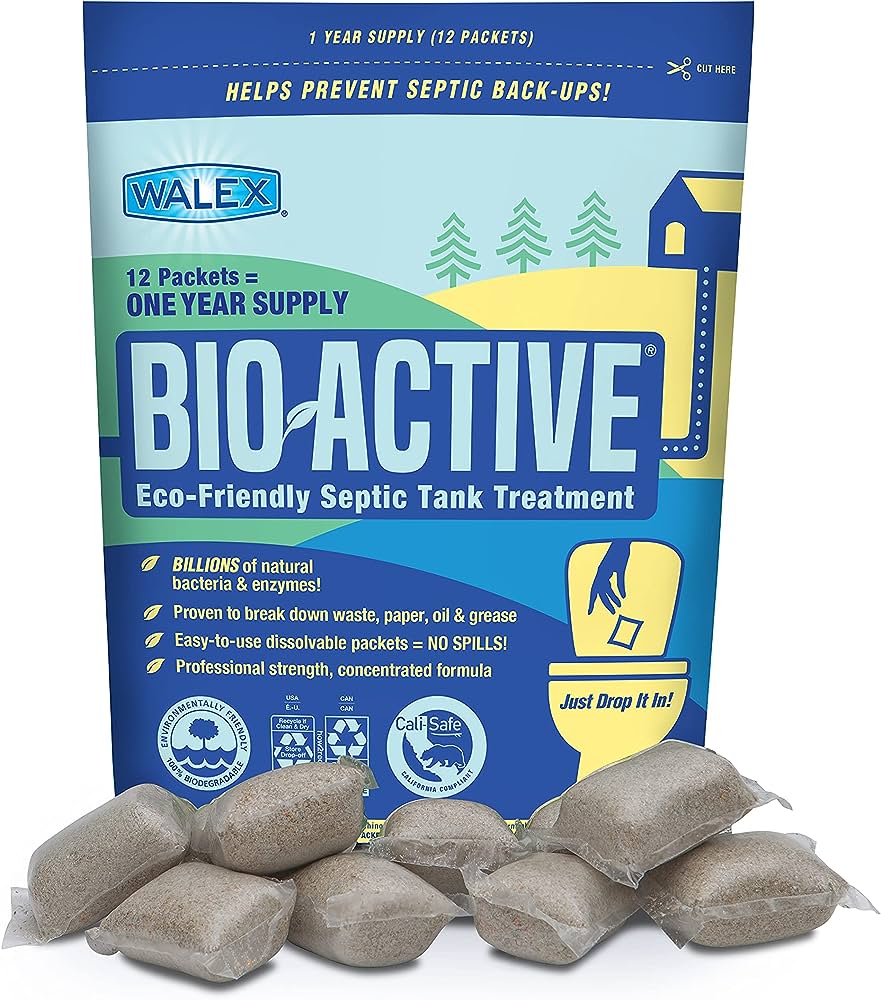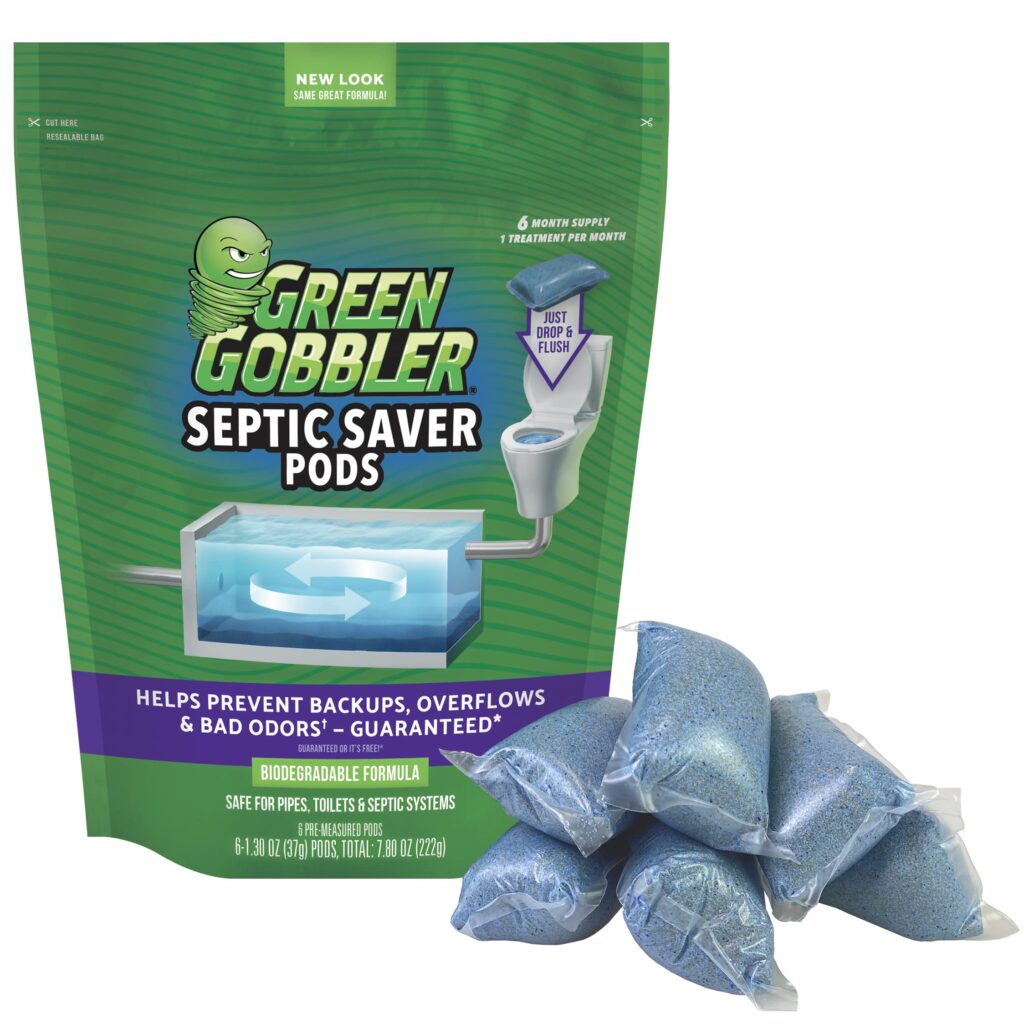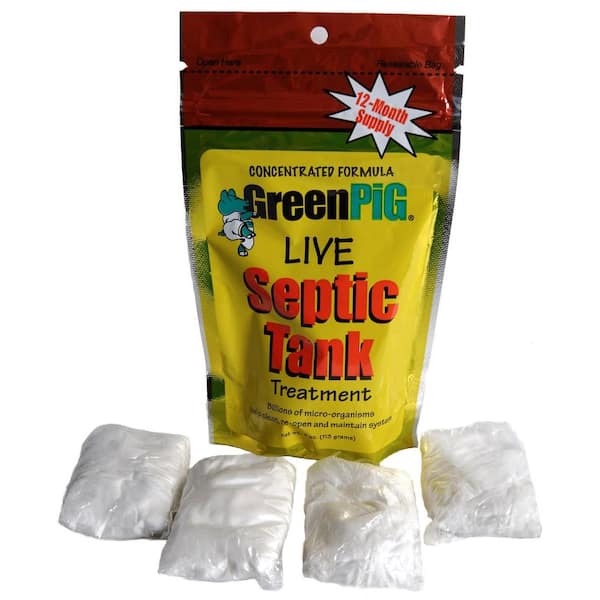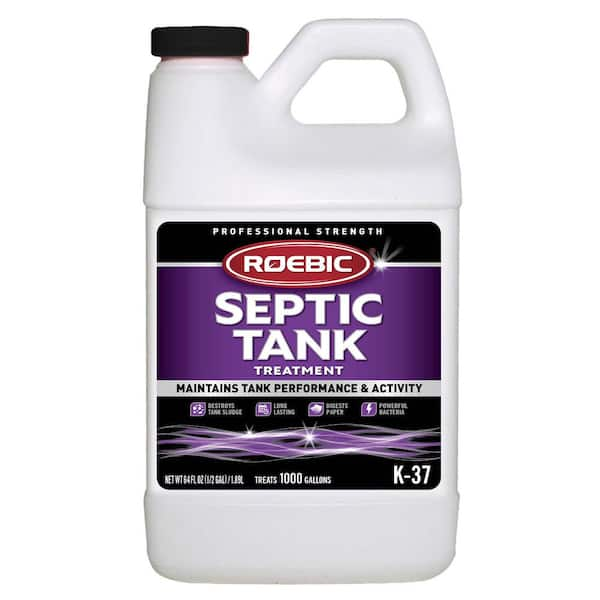If you’re researching the best septic tank treatments on the market, look no further. This article provides you with comprehensive reviews of various septic tank treatments available, helping you make an informed decision on which product will best suit your needs. Discover the key features, pros, and cons of each treatment, and learn how to maintain a healthy and efficient septic system in your home. Say goodbye to septic tank problems with the help of this valuable resource.

Understanding Septic Tank Treatments
What is a septic tank?
A septic tank is an underground wastewater treatment system commonly used in rural areas without access to a centralized sewer system. It is typically made of concrete, fiberglass, or plastic, and it functions as a primary treatment for household wastewater.
How does a septic tank work?
The basic process of a septic tank involves the separation and decomposition of solid waste and the discharge of treated wastewater into the surrounding soil. When wastewater enters the septic tank, it undergoes a natural separation process. Solid waste, known as sludge, settles at the bottom of the tank, while oils and grease float to the top, forming a scum layer. The liquid portion, known as effluent, flows out of the tank and into the drain field.
The need for septic tank treatments
Septic tank treatments are essential to maintain the proper functioning and longevity of the system. Without regular treatments, solid waste can accumulate, leading to clogs and blockages in the pipes. Additionally, untreated wastewater can contain harmful bacteria and pollutants that can contaminate the groundwater, posing risks to both human health and the environment.
Benefits of regular septic tank treatments
Regular treatments provide numerous benefits for septic tank owners. Firstly, they help to break down solid waste more effectively, reducing the chances of clogs and backups. Secondly, treatments can help control unpleasant odors that often emanate from the septic system. Lastly, by promoting the healthy decomposition of waste, regular treatments help prolong the lifespan of the septic tank, potentially saving homeowners from costly repairs or replacements.
Factors to Consider when Choosing Septic Tank Treatments
Type of septic tank
The type of septic tank you have is an important factor to consider when choosing treatments. Different types of tanks may have specific requirements or compatibility issues with certain treatments. Whether you have a concrete, fiberglass, or plastic septic tank, it is crucial to select treatments that are safe and suitable for your specific tank material.
Size of the septic tank
The size of your septic tank will also impact the selection of treatments. Larger tanks may require higher dosages or different formulations to effectively treat the wastewater. Understanding the capacity and dimensions of your septic tank will help you determine the appropriate treatments to use.
Number of occupants
The number of occupants in your household directly affects the amount of wastewater generated and the workload of your septic system. More residents mean increased wastewater production, which may necessitate more robust treatments to handle the higher load. Considering the number of occupants is crucial when choosing the right treatments for your septic tank.
Environmental impact
It is essential to consider the environmental impact of septic tank treatments. Some treatments contain chemicals that may negatively affect the environment, contaminating groundwater or harming beneficial microorganisms. Opting for environmentally friendly treatments ensures the health and sustainability of both your septic system and surrounding ecosystems.
Budget considerations
Budget is another significant factor to consider when choosing septic tank treatments. Treatments vary in price, and it is important to find a balance between affordability and effectiveness. While it may be tempting to opt for cheaper options, it’s important to keep in mind that investing in high-quality treatments can save you money in the long run by preventing costly repairs or replacements.
Types of Septic Tank Treatments
Chemical treatments
Chemical treatments typically consist of a blend of various chemicals that help break down waste and control odors. These treatments often contain potent disinfectants, enzymes, and other additives that accelerate the decomposition process. Chemical treatments can be highly effective in breaking down waste quickly and efficiently.
Natural treatments
Natural septic tank treatments often rely on the use of natural enzymes and bacteria to facilitate the decomposition of waste. These treatments are environmentally friendly and safe for both human health and the ecosystem. While natural treatments may take longer to show results, they offer long-lasting and sustainable benefits.
Enzyme-based treatments
Enzyme-based treatments harness the power of specialized enzymes to break down organic waste within the septic tank. Enzymes act as catalysts, accelerating the decomposition process and allowing for more efficient waste breakdown. These treatments are typically safe for the environment and are ideal for maintaining a healthy septic system.
Bacteria-based treatments
Bacteria-based treatments utilize beneficial bacteria that naturally occur in septic systems. These bacteria aid in waste digestion and promote the decomposition process. Bacteria-based treatments are known for their effectiveness in breaking down waste and minimizing odors. They are often recommended for septic systems with significant waste loads.
Additives and supplements
In addition to chemical, natural, enzyme, and bacteria-based treatments, there are various additives and supplements available for septic tanks. These products may include substances like yeast, nutrients, or even oxygen-releasing compounds. Additives and supplements can enhance the overall performance of septic tank treatments when used in conjunction with other treatment methods.
Benefits and Drawbacks of Chemical Treatments
Efficiency in breaking down waste
Chemical treatments are often highly efficient in breaking down solid waste within the septic tank. The blend of chemicals works to accelerate the decomposition process, ensuring that waste is effectively broken down and liquefied. This increased rate of waste breakdown helps prevent clogs and backups, keeping the septic system functioning properly.
Effectiveness in odor control
Chemical treatments are also known for their effectiveness in controlling unpleasant odors that can arise from septic tanks. The chemicals in these treatments work to neutralize and eliminate odor-causing compounds, leaving your septic system smelling fresh and clean. This can be particularly beneficial for households located in close proximity to neighbors or areas where odors are a concern.
Potential harm to the environment
One of the potential drawbacks of chemical treatments is their potential harm to the environment. Some chemical treatments contain harsh ingredients that can negatively impact the delicate balance of the ecosystem. These chemicals, if not properly managed, can leach into the soil and contaminate groundwater or harm beneficial microorganisms.
Possible damage to septic system components
Certain chemical treatments may have a corrosive effect on the components of the septic system. These treatments, if used in excess or not properly diluted, can damage pipes, concrete tank walls, or other system components. It is crucial to carefully follow the instructions when using chemical treatments to avoid potential damage to the septic system infrastructure.
Short-term vs. long-term results
While chemical treatments may provide quick and noticeable results in terms of waste breakdown and odor control, their effects may be short-lived. Some chemical treatments offer only temporary solutions, requiring frequent reapplication or maintenance. This can result in higher long-term costs and potential dependency on these treatments.

Effectiveness of Natural Septic Tank Treatments
Eco-friendly alternatives
Natural septic tank treatments offer environmentally friendly alternatives to chemical treatments. These treatments rely on the use of natural enzymes and bacteria to break down waste, minimizing the impact on the environment. Natural treatments pose no risk of contaminating groundwater or harming beneficial microorganisms, ensuring a healthier ecosystem.
Slow breakdown of waste
One important factor to consider with natural treatments is the slower breakdown of waste compared to chemical treatments. Natural enzymes and bacteria require more time to decompose solid waste, which means the results may not be as immediate as with chemical treatments. However, the slow breakdown process often leads to more thorough and long-lasting results.
Limited odor control capabilities
While natural septic tank treatments do contribute to odor control, their capabilities may be more limited compared to chemical treatments. Natural treatments may not completely eliminate odors but can help minimize them over time. If odor control is a top priority, it may be beneficial to combine natural treatments with other methods to achieve the desired results.
Minimal impact on the septic system
Another advantage of natural treatments is their minimal impact on the septic system components. These treatments are typically safe for pipes, tank walls, and other infrastructure, reducing the risk of damage from corrosive substances. Natural treatments are gentle on the septic system, ensuring its longevity and reducing the need for costly repairs.
Sustainability and long-lasting results
Natural septic tank treatments offer sustainable and long-lasting results. Once established, the natural enzymes and bacteria continue to break down waste and maintain a healthy septic system. This reduces the frequency of treatments and extends the lifespan of the septic tank, ultimately saving homeowners time, effort, and money in the long run.
Enzyme-based Treatments: How Do They Work?
Enzyme functions in septic tanks
Enzymes play a crucial role in the decomposition of waste within septic tanks. These specialized proteins act as catalysts, speeding up the chemical reactions involved in breaking down organic matter. Enzymes target specific types of waste, such as fats, oils, and proteins, ensuring efficient waste breakdown and preventing the accumulation of solids in the tank.
Benefits of enzyme-based treatments
Enzyme-based treatments offer numerous benefits for septic tank owners. Firstly, enzymes accelerate the decomposition process, breaking down waste more rapidly compared to natural breakdown. This helps prevent clogs and backups, ensuring the proper functioning of the septic system. Secondly, enzymes aid in odor control, neutralizing odor-causing compounds and leaving the septic system smelling fresh and clean.
Drawbacks and limitations
While enzyme-based treatments are effective in waste breakdown and odor control, they may have limitations. Enzymes work best under specific conditions, such as the optimal temperature and pH levels within the septic tank. If these conditions are not met, the effectiveness of the enzymes may be reduced. It is crucial to use enzyme-based treatments as directed and ensure the septic system’s environment is conducive to enzyme activity.
Suitable applications and scenarios
Enzyme-based treatments are suitable for a wide range of septic tank applications and scenarios. They can be used as a regular maintenance treatment to promote healthy waste breakdown and prevent clogs and backups. Enzyme treatments are also beneficial for septic systems experiencing high waste loads or those with a history of odor problems. They provide targeted treatment for specific types of waste, enhancing overall system performance.
Compatibility with other treatments
Enzyme-based treatments are generally compatible with other types of septic tank treatments. They can be used in conjunction with natural treatments, bacteria-based treatments, or certain chemical treatments for enhanced results. It is important to review the product instructions and consult with professionals to ensure compatibility and avoid any potential adverse interactions.

Bacteria-based Treatments: Pros and Cons
Role of bacteria in septic tanks
Bacteria play a crucial role in the decomposition and breakdown of waste within septic tanks. They are naturally present in the septic system and aid in the digestion of organic matter. Bacteria break down waste by consuming the organic material and converting it into simpler compounds. This process helps maintain a healthy balance within the septic tank and promotes proper waste breakdown.
Effectiveness in waste breakdown
Bacteria-based treatments are highly effective in waste breakdown. These treatments introduce beneficial bacteria into the septic system, supplementing the existing bacterial population. The added bacteria enhance the decomposition process, improving the breakdown of organic matter and preventing the accumulation of solids. This leads to a more efficient septic system and reduces the risk of clogs and backups.
Odor elimination capabilities
Bacteria-based treatments also contribute to odor elimination within the septic system. As the bacteria consume organic waste, they produce fewer odor-causing compounds. This reduction in odor helps maintain a more pleasant environment both within the septic tank and in the surrounding areas. Bacteria-based treatments can greatly improve the overall odor control capabilities of the septic system.
Variables affecting bacterial performance
While bacteria-based treatments are generally effective, their performance can be influenced by various variables. Factors such as temperature, pH levels, and excessive use of antibacterial substances can inhibit bacterial activity. It is crucial to maintain optimal conditions within the septic system to ensure the bacterial treatments work efficiently. Regular treatments and proper septic system maintenance can help create a favorable environment for bacterial growth and activity.
Maintenance and dosing requirements
Bacteria-based treatments require regular maintenance and dosing to maintain their effectiveness. These treatments often come in the form of monthly or quarterly applications, depending on the product and septic system requirements. It is important to follow the recommended dosage instructions and maintain a consistent treatment schedule to ensure the continued health and performance of the septic system.
Choosing the Right Additives and Supplements
Purpose and benefits of additives
Additives and supplements are additional products that can enhance the performance of septic tank treatments. These products serve various purposes, such as improving bacterial activity, reducing odors, or breaking down specific types of waste more effectively. Additives can provide targeted benefits for specific issues or help optimize the overall performance of septic tank treatments.
Different types and their functions
Additives and supplements come in a variety of types, each serving a specific function. Some examples include oxygen-releasing compounds to enhance bacterial activity, septic-friendly detergents to reduce grease buildup, or yeast-based products to aid in the breakdown of paper and other organic materials. Understanding the different types of additives and their respective functions can help you choose the right product for your specific needs.
Potential risks and side effects
While additives and supplements can provide benefits, they may also have potential risks and side effects if misused or overused. Some products may contain chemicals that can be harmful to the septic system or the environment. It is crucial to carefully read the product labels, follow the instructions, and use additives and supplements responsibly to avoid any adverse effects.
Compatibility with existing treatments
It is important to consider the compatibility of additives and supplements with existing septic tank treatments. Some products may not work well together or may have interactions that reduce their effectiveness. Consulting with professionals or experts specializing in septic systems can help you determine which additives and supplements are compatible with your current treatment regimen.
Recommendations from experts
Getting recommendations from experts or professionals is highly beneficial when choosing additives and supplements for your septic tank. They can provide valuable insights based on their knowledge and experience, helping you make informed decisions. Whether consulting with a septic specialist, local health department, or reputable product manufacturer, seeking expert advice can lead to optimal results and a healthier septic system.

Reviews and Ratings of Popular Septic Tank Treatments
Product A: Features, pros, and cons
Product A is a chemical-based septic tank treatment that boasts high efficiency in waste breakdown and odor control. It is composed of a potent blend of chemicals that accelerate the decomposition process, preventing clogs and backups. The treatment also contains odor-neutralizing agents, ensuring a fresh and clean-smelling septic system. While Product A provides quick results, some users have expressed concerns about potential harm to the environment and potential damage to system components if not used properly.
Product B: Features, pros, and cons
Product B is a natural septic tank treatment that harnesses the power of enzymes and bacteria to break down waste. It promotes environmentally friendly waste breakdown and provides long-lasting results. Users have praised Product B for its sustainability and minimal impact on the septic system. However, some have mentioned that the breakdown process may be slower compared to chemical treatments, and odor control capabilities may not be as strong.
Product C: Features, pros, and cons
Product C is an enzyme-based septic tank treatment that focuses on optimizing waste breakdown and promoting a healthy septic system. Enzymes present in the treatment accelerate the decomposition process, effectively breaking down organic waste. Users have reported positive results in terms of waste breakdown and odor control. However, some users have found the treatment less effective in extreme temperature conditions or when the septic system pH levels are not well-maintained.
Product D: Features, pros, and cons
Product D is a bacteria-based septic tank treatment that introduces beneficial bacteria into the septic system to enhance waste breakdown. It is highly effective in preventing clogs and backups and provides excellent odor elimination capabilities. Users appreciate the ease of use and the long-term results obtained with Product D. However, some have mentioned the need for regular maintenance and dosing to ensure consistent bacterial performance.
Comparative analysis and customer feedback
Comparing the different products based on their features, pros, and cons can help make an informed decision. Reading customer feedback and reviews can also provide valuable insights into the real-life performance and effectiveness of the treatments. It is important to consider factors such as cost, ease of use, and compatibility with your specific septic system when evaluating the different products.
Dos and Don’ts of Using Septic Tank Treatments
Proper dosage and application
To maximize the effectiveness of septic tank treatments, it is crucial to use the proper dosage and follow the recommended application instructions. Using too little may result in inadequate waste breakdown, while using too much can potentially harm the septic system or the environment. Reading and understanding the product labels will help ensure appropriate dosage and application.
Frequency of treatments
Determining the appropriate frequency of treatments is essential for maintaining a healthy septic system. Different treatments may have varying recommended schedules, such as monthly, quarterly, or semi-annually. Consider the size of your septic tank, the number of occupants in your household, and the load on your septic system when determining the ideal treatment frequency. Regular treatments are key to prevent waste buildup and ensure the longevity of the system.
Avoiding harmful substances
To maintain the health and optimal performance of your septic system, it is important to avoid introducing harmful substances. Harsh chemicals, antibacterial soaps, grease, and non-biodegradable materials can disrupt the bacterial balance in the septic tank and hinder the waste breakdown process. It is advisable to use septic-safe products and practice responsible waste disposal to avoid potential harm to the septic system.
Regular septic tank maintenance
In addition to septic tank treatments, regular maintenance is crucial for the overall health and functionality of the septic system. This includes regular inspections, septic tank pumping, and addressing any issues promptly. Regular maintenance helps identify potential problems early on and allows for timely repairs or interventions, ensuring the long-term efficiency and longevity of the septic system.
Monitoring and troubleshooting
Monitoring the performance of your septic system is an ongoing responsibility. Keep an eye out for signs of potential problems, such as slow drains, foul odors, or wet spots in your yard. Rapidly addressing any issues can prevent more significant complications and significant expenses. If you encounter persistent issues or are unsure about the proper course of action, consulting with septic system professionals is recommended.

